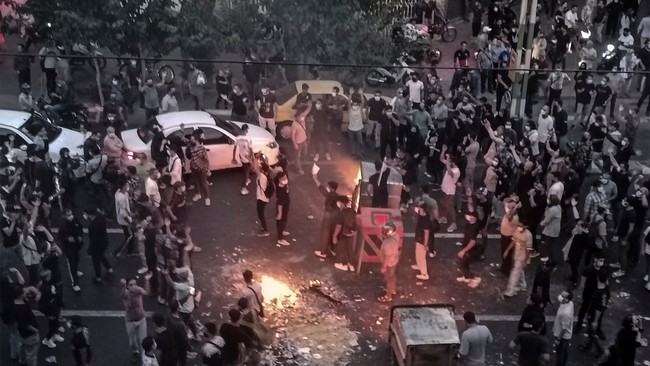
We are pleased to present this guest essay from Robert G. Joseph, Special Envoy for Nuclear Non-Proliferation under George W. Bush, and Robert Toricelli, former Democrat Senator from New Jersey.
As always, the opinions expressed by the guest author do not necessarily represent those of Hot Air or Townhall Media.
Bipartisan Agreement: Iran’s Future, Iranians’ Choice
By: Robert G. Joseph and Robert G. Torricelli
For many observers, it is apparent that the challenge posed by the Islamic Republic—a challenge that has confronted successive administrations—is reaching a climax. The tide against the mullahs’ rule has been building for some time. There have been several major nationwide uprisings—each more pervasive and inclusive than the last. The most recent, which began in September 2022, lasted for months and shook the religious dictatorship to its core, calling for regime change by the Iranian people and the establishment of a secular, democratic republic. This was followed by Tehran’s colossal defeats in the region, including the near destruction of Hamas, the severe setbacks of Hezbollah and the Houthis, and the fall of the Assad regime—the linchpin of Tehran’s regional strategy for 4 decades. These developments have left the regime at its weakest point ever. With a population in near revolt and the Trump administration resuming its “maximum pressure” policy, the mullahs now face a crisis on all fronts.
As these dynamics converge to the detriment of the ayatollahs, and strong indications suggest that the regime is entering its final phase, policymakers in Washington and other capitals must be careful not to throw a lifeline to the regime that has for far too long denied the Iranian people freedom and democracy. One notion of concern is the idea of Americans sponsoring a coalition of exile opposition groups. This concept, while perhaps well-intentioned, could prove to be a gift to the ayatollahs even if it were to fail.
For decades, the regime’s primary propaganda point against growing opposition has been that it is not indigenous, that it lacks popular support, and that it is a creation of the United States and its intelligence agencies. Proposals that play into these notions could hand the ayatollahs’ propaganda machine unprecedented ammunition, both at home and abroad. In this context, the notion that Americans, Israelis, or any foreign source should forge a coalition of Iranian exile groups not only conjures up the history of neocolonialism but could also offend thousands of patriotic Iranians who have risked their lives, fighting and dying, to reclaim their country from extremist rule.
Even more potentially destructive of the cause for democracy in Iran is that some proposals reportedly center around Reza Pahlavi, the eldest son of Iran’s last monarch, who was ousted by a popular revolution in 1979. The Pahlavi regime’s rule, marked by one-party dominance, repression, torture, executions, and rampant corruption under the notorious SAVAK, left a dark legacy. Any perceived nostalgia that might exist primarily among remnants of the Pahlavi monarchy outside of Iran does not exist inside the country, where the Pahlavi Dynasty is a mere bad memory.
Even among monarchist circles, Reza Pahlavi is generally seen as non-serious and divisive. He has never disavowed the crimes of his father. Disturbingly, some of SAVAK’s senior officials reportedly remain in his inner circle. Very tellingly, a number of the regime’s insiders have sprung up as his advisors. He has publicly boasted of connections with senior IRGC figures—the very institution behind Iran’s domestic repression, regional terror, and drive to acquire nuclear weapons. Perhaps most troubling still, he has suggested preserving the IRGC if its leadership changes—a notion akin to claiming to oppose Nazi rule while wanting to retain the Gestapo.
Reza Pahlavi holds no standing among Iranians. At the height of the 2022 uprising, The Washington Post reported chants of “death to the shah, death to the religious leader”—a clear rejection of all forms of autocracy. His rallies abroad attract only a few dozen or, at most, a few hundred attendees. The slogan “King Reza Pahlavi, God of every Iranian,” broadcast before his speeches, reflects a mindset detached from Iran’s democratic aspirations and is widely rejected by the diaspora.
The idea that Reza Pahlavi should be a part of any coalition for change in Iran is pleasing only to the ayatollahs. In fact, many Iranian activists—both in exile and within Iran—suggest that the regime props up Reza to reinforce the perception that the only alternative to the current regime is a return to monarchical dictatorship. It’s a classic move from the mullahs’ playbook.
Iran is ready for change. But that change will come from inside Iran, from the Iranian people themselves.










